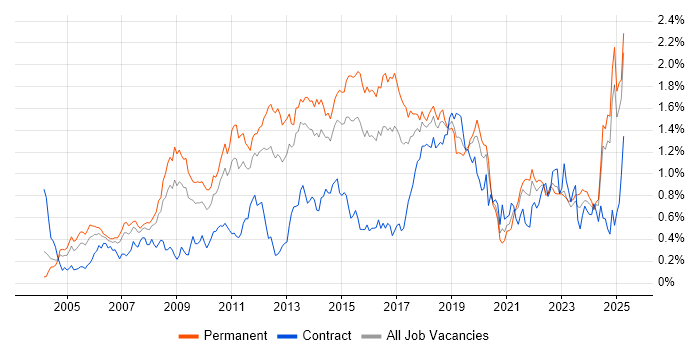Enterprise Application Software
England > Midlands
The table below looks at the prevalence of the term Enterprise Software in permanent job vacancies in the Midlands. Included is a benchmarking guide to the salaries offered in vacancies that cited Enterprise Software over the 6 months leading up to 5 March 2026, comparing them to the same period in the previous two years.
| 6 months to 5 Mar 2026 |
Same period 2025 | Same period 2024 | |
|---|---|---|---|
| Rank | 152 | 88 | 188 |
| Rank change year-on-year | -64 | +100 | +68 |
| Permanent jobs citing Enterprise Software | 80 | 176 | 95 |
| As % of all permanent jobs in the Midlands | 0.84% | 3.22% | 1.07% |
| As % of the Miscellaneous category | 2.76% | 8.81% | 3.07% |
| Number of salaries quoted | 50 | 53 | 67 |
| 10th Percentile | £42,500 | £37,346 | £27,300 |
| 25th Percentile | £48,875 | £42,500 | £46,250 |
| Median annual salary (50th Percentile) | £62,500 | £51,000 | £65,000 |
| Median % change year-on-year | +22.55% | -21.54% | +10.17% |
| 75th Percentile | £75,000 | £65,625 | £76,250 |
| 90th Percentile | £81,125 | £72,750 | £85,000 |
| England median annual salary | £70,000 | £65,000 | £70,000 |
| % change year-on-year | +7.69% | -7.14% | +3.70% |
All Generic Skills
Midlands
Enterprise Software falls under the General and Transferable Skills category. For comparison with the information above, the following table provides summary statistics for all permanent job vacancies requiring generic IT skills in the Midlands.
| Permanent vacancies with a requirement for generic IT skills | 2,897 | 1,998 | 3,095 |
| As % of all permanent jobs advertised in the Midlands | 30.33% | 36.60% | 34.76% |
| Number of salaries quoted | 1,195 | 930 | 2,327 |
| 10th Percentile | £26,250 | £30,000 | £25,750 |
| 25th Percentile | £30,000 | £38,750 | £33,750 |
| Median annual salary (50th Percentile) | £45,000 | £54,125 | £49,500 |
| Median % change year-on-year | -16.86% | +9.34% | -10.00% |
| 75th Percentile | £63,750 | £66,967 | £61,625 |
| 90th Percentile | £78,790 | £75,000 | £73,000 |
| England median annual salary | £55,345 | £62,500 | £55,000 |
| % change year-on-year | -11.45% | +13.64% | -15.38% |
Enterprise Software
Job Vacancy Trend in the Midlands
Historical trend showing the proportion of permanent IT job postings citing Enterprise Software relative to all permanent IT jobs advertised in the Midlands.

Enterprise Software
Salary Trend in the Midlands
Salary distribution trend for jobs in the Midlands citing Enterprise Software.

Enterprise Software
Salary Histogram in the Midlands
Salary distribution for jobs citing Enterprise Software in the Midlands over the 6 months to 5 March 2026.
Enterprise Software
Job Locations in the Midlands
The table below looks at the demand and provides a guide to the median salaries quoted in IT jobs citing Enterprise Software within the Midlands region over the 6 months to 5 March 2026. The 'Rank Change' column provides an indication of the change in demand within each location based on the same 6 month period last year.
| Location | Rank Change on Same Period Last Year |
Matching Permanent IT Job Ads |
Median Salary Past 6 Months |
Median Salary % Change on Same Period Last Year |
Live Jobs |
|---|---|---|---|---|---|
| West Midlands | -47 | 58 | £62,500 | +30.21% | 16 |
| East Midlands | -45 | 21 | £45,000 | -30.50% | 7 |
| Enterprise Software England |
|||||
Enterprise Software
Co-Occurring Skills & Capabilities in the Midlands by Category
The following tables expand on the one above by listing co-occurrences grouped by category. They cover the same employment type, locality and period, with up to 20 co-occurrences shown in each category:
|
|
||||||||||||||||||||||||||||||||||||||||||||||||||||||||||||||||||||||||||||||||||||||||||||||||||||||||||||||||||||||||||||||
|
|
||||||||||||||||||||||||||||||||||||||||||||||||||||||||||||||||||||||||||||||||||||||||||||||||||||||||||||||||||||||||||||||
|
|
||||||||||||||||||||||||||||||||||||||||||||||||||||||||||||||||||||||||||||||||||||||||||||||||||||||||||||||||||||||||||||||
|
|
||||||||||||||||||||||||||||||||||||||||||||||||||||||||||||||||||||||||||||||||||||||||||||||||||||||||||||||||||||||||||||||
|
|
||||||||||||||||||||||||||||||||||||||||||||||||||||||||||||||||||||||||||||||||||||||||||||||||||||||||||||||||||||||||||||||
|
|
||||||||||||||||||||||||||||||||||||||||||||||||||||||||||||||||||||||||||||||||||||||||||||||||||||||||||||||||||||||||||||||
|
|
||||||||||||||||||||||||||||||||||||||||||||||||||||||||||||||||||||||||||||||||||||||||||||||||||||||||||||||||||||||||||||||
|
|
||||||||||||||||||||||||||||||||||||||||||||||||||||||||||||||||||||||||||||||||||||||||||||||||||||||||||||||||||||||||||||||
|
|
||||||||||||||||||||||||||||||||||||||||||||||||||||||||||||||||||||||||||||||||||||||||||||||||||||||||||||||||||||||||||||||
|
|||||||||||||||||||||||||||||||||||||||||||||||||||||||||||||||||||||||||||||||||||||||||||||||||||||||||||||||||||||||||||||||
